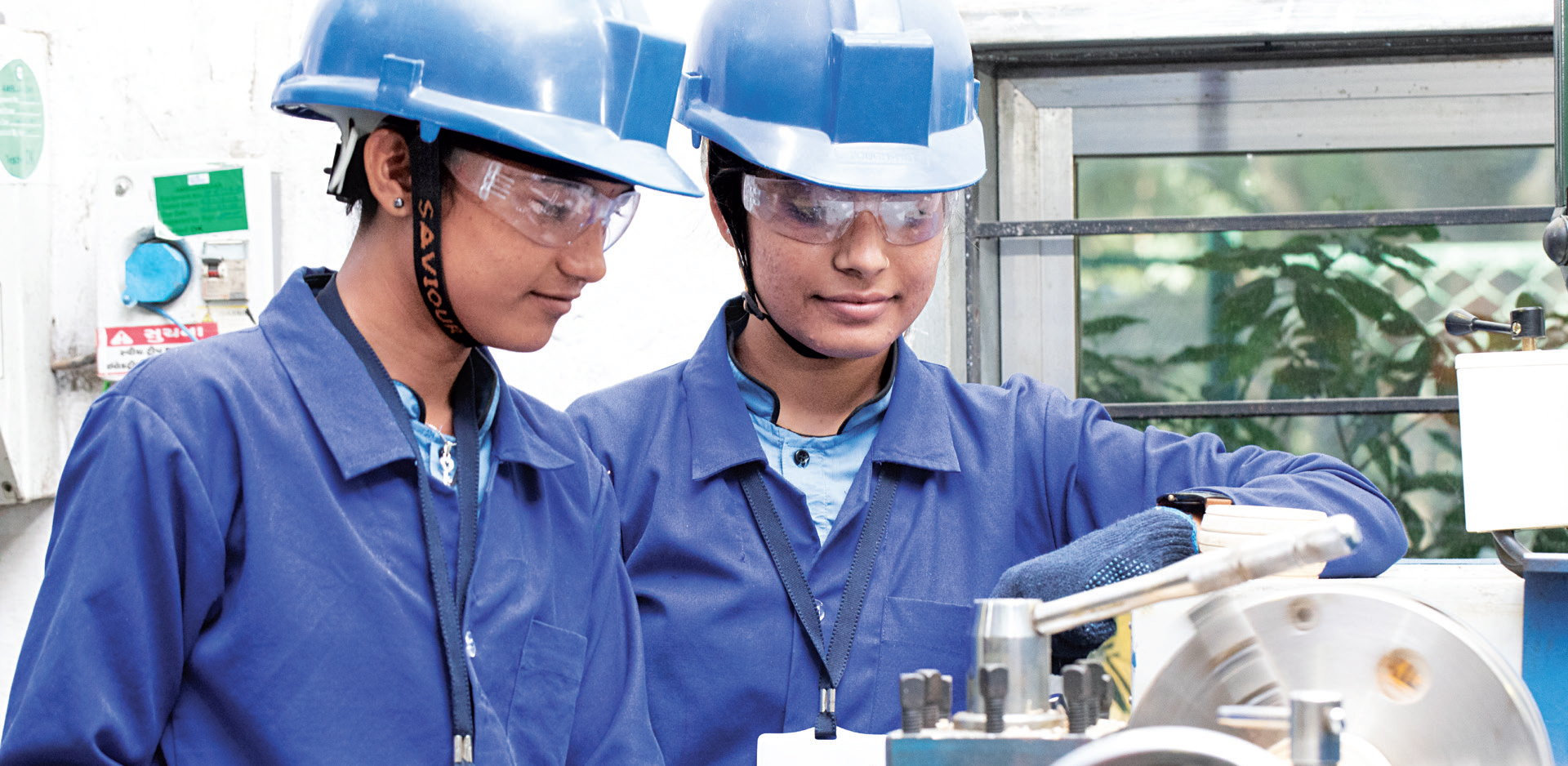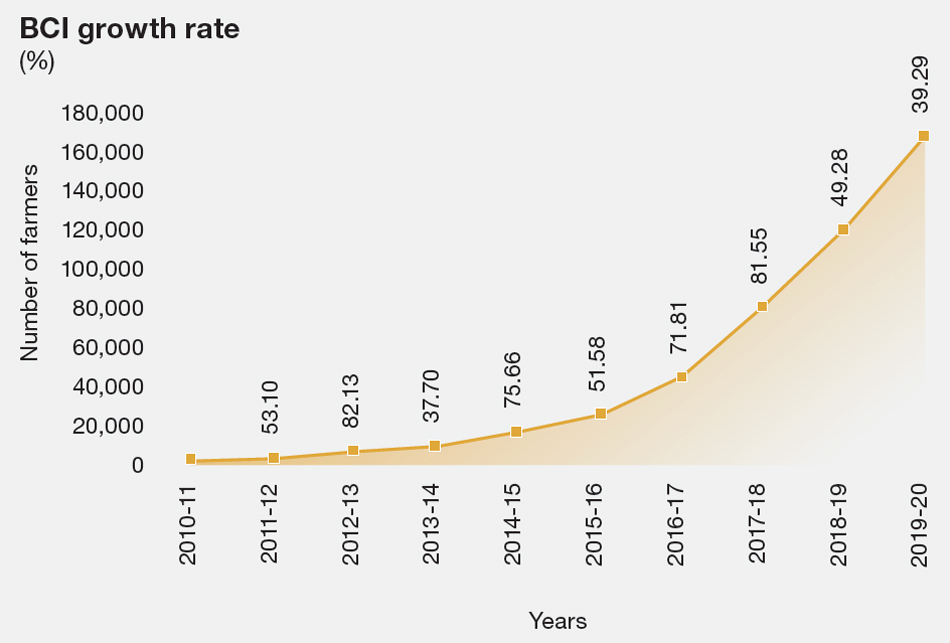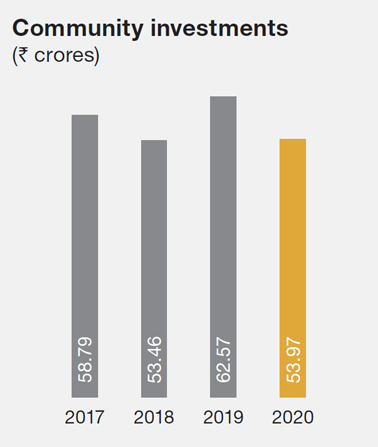CSR governance at Ambuja
Cement
As per section 135 of the Companies
Act, 2013 which pertains to the
CSR law for the companies, we
have constituted a Board-level CSR
& Sustainability Committee with
Independent Directors. We have also
formulated a CSR policy which clearly
mentions the CSR activities carried out
as per Schedule VII of the Companies
Act, 2013.
We primarily allocate our CSR
implementation through our social
development arm the Ambuja Cement
Foundation (ACF) working mainly with
communities around the manufacturing
sites across 11 states. We also run five
English medium schools under our
Ambuja Vidya Niketan Trust providing
quality education to benefit local
communities around the plant areas.
We also maintain a multi-speciality
hospital in Ambujanagar (Kodinar),
Gujarat through the Ambuja Hospital
Trust to provide quality health treatment
to the local communities.
The major focus of our CSR spend
is invested in the host communities
impacted around the manufacturing
sites with thorough needs assessment
conducted with the communities.
Based on the need assessment and to
largely enhance prosperity, six verticals
have been identified: water resource
management, livelihoods (agro‑based
and skill and entrepreneurship
development), health and sanitation,
women empowerment and
quality education. We ensure people’s
participation by creating village-level
institutions with capacity building
invested for these institutions so that
projects carried out by the people are
self-sustaining.
ACF has formed a data management
and research cell to monitor all ongoing
projects with mid-course evaluation
to ensure strategic social investment.
All mature projects are subject to
evaluation and impact assessment.
External consultants and institutions
support in carrying impact assessment
of critical projects.
Key community intervention areas
Over the years, ACF has helped
formalise the structure for our
interventions (through farmers’ clubs,
farmer producers’ organisations,
women’s federations, water user
groups, among others). The Foundation
has also created village-level leaders to
coordinate the programmes effectively
and holistically help households thrive.
Water
Water has been the key focus area for
Ambuja Cement since the beginning.
India is faced with unprecedented
water crisis where demand has
outstripped supply. The primary aim
of ACF is to address the water scarcity
issues faced by the community by way
of promoting water harvesting and
conservation, river interlinking, safe and
adequate drinking water availability and
judicial water use. The water resource
management programme has grown in
dimension, in keeping with local needs
across locations. ACF also focuses
on water-saving techniques through
promotion of sprinkler and micro
irrigation system for efficient usage
of water.
ACF carries out its water conservation
efforts with the support and active
participation of relevant government
bodies, NGOs and the community itself.
Our efforts have been instrumental in
bringing positive changes in people’s
lives and biodiversity across regions
of our operations, especially in water
starved areas. We ensure that no water
source or protected area (nationally
or internationally) is disturbed for
water withdrawal. We encourage
sustainable withdrawals, water
efficiency, responsible water harvesting
and groundwater recharges to ensure
continuous supply to address water
scarcity; and bring down the number of
people affected by water
scarcity considerably.
We have developed water sustainability
risk assessment framework in
association with IUCN to account
business/Company risks as well as
the basin risk, covering various risk
aspects and identifying units with water
stress. This assessment also uses the
WBCSD Global Water Tool. Two of our
plants are in water scarce regions but
overall, we comply with all regulatory
requirements on water.
34
Beneficiaries from COVID-19
related interventions
(lakh)
Performance in 2020
- Developed and revived 83 water
harvesting and recharge structures
and 14 dams, amounting to storage
capacity of 0.60 million m3, taking
the total count to 14,060 water
harvesting and recharge
structures, 458 check dams and
59.24 million m3, respectively
- Developed 3,134 Ha of watershed
through water and soil conservation
- Three river lift irrigation projects
were undertaken resulting in 125 Ha
of area under double crop
- Installed and revived 318 hand
pumps across locations
Agri-based livelihood initiatives
Agro-based livelihood generation
remains a major focus area for
ACF to improve the productivity of
agricultural lands for improved yields
and economic prosperity. This is done
by building capacities of farmers and
introducing scientific farm practices
with greater use of technology for
sustainable production.
Agro-based livelihood initiatives are
being implemented in 17 locations
across nine states covering more than
2 million farmers. The initiatives besides
working for enhanced practices for
sustainable agriculture, comprises
other allied initiatives such as animal
husbandry projects, including dairy,
poultry, aquaculture and goat rearing.
Performance in 2020
- Animal husbandry projects were
extended to 15 locations covering
8,500 families
- 154 low-cost polyhouses built in
Sankrail to help enhance income
- ~1,079 Ha of area covered under
micro irrigation
- 3 new farmer-producer
organisations were formed during
the year, taking the total to 14,
covering 2.1 lakh farmers
- More than 30,000 women farmers
participated in various training
initiatives conducted by the
Foundation
- Better Cotton Initiative (BCI) was
extended to 1,418 more villages
during the year, benefiting
1.69 lakh farmers
Protecting
The Climate
We have promoted community-based
farmers’ organisations, registered
as Farmer Producer Organisation
(FPOs). These FPOs help in sourcing,
processing and delivering biomass
from member farmers as well as
educating other farmers about the
environmental impacts of crop waste
residue burning. During 2020, among
other businesses, the FPOs supplied
26,242 metric tonnes of biomass from
Rabriyawas (Rajasthan), Ambujanagar
(Gujarat), Ropar (Punjab) and
Chandrapur (Maharashtra).
Skill-based livelihood initiatives
To contribute to nation-building ACF
set up the Skill and Entrepreneurship
Development Institute (SEDI) to provide
meaningful alternative employment
opportunities to the country’s youth.
More than 33 SEDI centres are
operational across 10 states in the
country, with more than 65,000 people
placed in various roles. ACF has
partnered with other corporates to
widen the scope of training as well as
provide placement opportunities.
Performance in 2020
- A new SEDI centre was initiated in
Ajmer, Rajasthan
- More than 65,000 people were
trained during the years with 74%
of the graduates placed in different
organisations. Women made
up 42% of the total number of
candidates against 41% in 2019
- Inspite of lockdown, SEDI centres
still continued training the rural
youth using innovative distance and
virtual technologies
- Capacity building of trainees and
improving their skills led to more
placements, increase in retention
rate and better job delivery,
despite COVID-19
- During the national lockdown,
Kodinar (Gujarat), Chandrapur
(Maharashtra) and Roorkee
(Uttarakhand) SEDIs were
recognised for providing their
General Duty Assistant trainees to
hospitals in urgent requirement
of staff
- SEDIs were also able to train
4,743 students and ensure job
placements to 3,472 students
during the lockdown

Health and sanitation
Communities residing in secluded and
distant regions around our plants lack
access to basic healthcare facilities.
Besides, it impacts our plant workforce
as the majority of our workforce
come from the nearby communities.
Hence it is imperative to ensure the
well-being of communities and the
neighbourhood around our plants. The
healthcare interventions by ACF helps
in ensuring appropriate healthcare for
our neighbourhood communities.
Performance in 2020
- Our village health functionaries
(Sakhis) helped in expanding our
Maternal and Child Healthcare
(MCH) interventions in villages,
reducing maternal deaths, neo-natal
mortality, still births and reached
institutionalised delivery of 87%
in our impact villages. The MCH
interventions reached additional
15 villages covering 28,573 families
- Community clinics supported by
village panchayats and village
development committees were
initiated in seven more villages
during the year. A total of 1,260
patients were treated through each
of the nine clinics in nine villages
during the year
- ACF was among the first to initiate
HIV/AIDS prevention measures for
truckers through its Health Care
Centres (HCC) and reach 33,471
truckers during 2020 across four
locations. More than 4,591 truckers were counselled through four
integrated counselling and testing
centres. Around 377 Sexually
Transmitted Infection (STI) and
12 HIV cases were identified during
the year. We initiated condom
distribution to educate and prevent
incidences of STI
- With evidence that rural
India is badly impacted by
non‑communicable diseases,
especially hypertension and
diabetes, a focused programme
using village leadership has been
initiated to address this issue
Women empowerment
Women are the central agents in rural
development for Ambuja Cement.
Key programmes such as health and
animal husbandry were strengthened
owing to the increasing participation of
women. Key projects around the areas
of drinking water supply and health and
sanitation are aimed at empowering
rural women and engaging them in
social and economic activities to
ensure overall rural prosperity.
Past studies conducted by
the Foundation in the areas of
maternal and child health or allied
agriculture interventions highlighted
that irrespective of programmes,
engagement of women in development
activities results in a higher level
of confidence among them and an
aspiration to do better.
Performance in 2020
- ACF promotes women-led Self-Help
Groups (SHGs) to build capacity
in managing accounts, credit
rotation and income generation.
The Foundation is supporting
more than 2,413 SHGs, with 26,513
members managing a total corpus
of `20.46 crores
- Currently, there are five women
federations which are formed
as an apex body to help women
achieve financial independence
while training them to address
mainstream issues like linking to
various government schemes,
sanitation and domestic violence
- With financial institutions releasing
schemes for women, ACF assisted
525 SHGs apply for the COVID Sahay Loan to receive `4.26 crores
as livelihood support. Women
trained in tailoring under the
livelihood enhancement programme
have made 4,52,000 face masks
and sold to health authorities,
medical stores and even to
Ambuja Cement
- Under the livelihood generation
programme, 500 women in Sankrail,
West Bengal and Punjab were
involved in the opportunity of
vegetable cultivation in kitchen
gardens during lockdown with
produce being procured by local
traders and sold in local markets
Education
At Ambuja Cement, education
intervention goes beyond contributing
to infrastructure development in
schools and colleges. It covers
programmes which help in the holistic
development of education systems in
the locations where we operate.
It involves infrastructure development
as well as introduction of teaching aids
and building capabilities for students
and teachers alike. In a period of three
years, 42 schools are now graded ‘A’
Category as compared to just 12 in
2016, reflecting a 350% jump. These
improvements underline the success of
ACF’s education programme.
One key initiative is the Ambuja
Manovikas Kendra (AMK), a school
for specially-abled students, catering
to 126 children. In 2020, 99 of them
are enrolled under regular schooling,
10 under home-based rehabilitation
and 17 at the skill development
centre. The project aims to train and
rehabilitate 50 specially‑abled youths
by 2021
We consider sports as one of the key
factors driving the holistic development
of students and introduced ‘Make
India Play’ as a pilot in 10 schools.
The programme is gaining increasing
popularity among students and school
authorities alike.
Water, sanitation and hygiene (WASH)
is one of the priority areas of the
Foundation. Its initiatives include
provisions of safe drinking water, hand
pump/submersibles, toilets and wash
basins, among others.
Performance in 2020
- Introduced smart classes in
10 schools
Extending support to communities
during COVID-19
The outbreak of COVID-19 and the
subsequent lockdown had deep impact on the community. We, at Ambuja
Cement, initiated a host of initiatives
through ACF. The initiatives included
awareness creation, Information,
Education and Communication (IEC)
material distribution, emergency
services, basic healthcare services,
creation of a dedicated Single Point Of
Contact (SPOC) in every village and
enhanced engagement with the health
systems. These steps resulted
in responsible behaviour in
the community.
Strategic interventions
| Awareness
creation |
IEC material
distribution |
Emergency
services |
Basic healthcare
services |
Creation
of SPOCs |
Engagement with
health systems |
- Education
on
COVID-19
spread,
prevention
measures
- Informed
panchayats
and villages
on movement
restriction
- Demos
on social
distancing,
use of face
mask and
handwashing
- Managing
isolation of
returning
migrants and
others
|
- Created
posters,
banners,
hoardings
and
pamphlets
- Information
posters for
village and
panchayat
distribution
- WhatsApp
update
messages
for truckers
for COVID-19
and
lockdown
|
- For private and
government
health centres
around villages
- Provided
oxygen,
ventilators and
ambulance
services
- Initiated
sanitation and
fumigation in
villages
- Distributed
safety kits,
PPE and hand
sanitisers
|
- Contacts
shared
for COVID
centres,
testing,
treatment
and facilities
- Directory
of toll-free
numbers and
essential
services,
including
PDS, shared
with the
community
|
- A SPOC
created in
every village
- Dissemination
of digital
content
through SPOCs
- Connect in the
community
through
WhatsApp
|
- Sakhi
engagement
with health
system
- Monitoring
home‑quarantined
migrants and
suspect or
confirmed
COVID-19
affected people
and families
|
Support initiatives
- Assisted 14,770+ families, returned
migrants and labourers in the
villages with ration kits
- Contributed 15 ventilators, 14
oxygen concentrators and five
oxygen cylinders for COVID
care centres
- Provided PPE kits, pulse oximeters,
medical and infrastructural
equipment
- Created livelihood opportunities –
4.5 lakh+ masks made and sold by
women, a livelihood fund created
for different locations, provided
`4.26 crores loan to 526 SHGs
applying for COVID-Sahay loans
- Participated in government
campaigns in Gujarat and Rajasthan
- 183+ staff participated across
locations for online training
programme on COVID-19
- Online mental health training
session covering 3,300+ people
As a step ahead, ACF is working
on measures to aid government’s
COVID-19 vaccination programme.
It has initiated vaccination awareness
programmes across villages and
is liaising with respective health
departments for behaviour change
communication interventions and
helping the frontline workers in the
vaccination process.



















